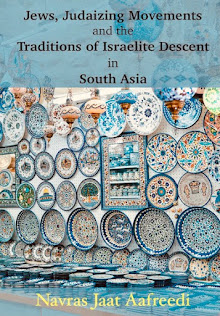Ashish Tripathi, The Times of India, Lucknow, November 12, 2007
It was not just the delightful dussehri mangoes which made Eyal Beeri come all the way from Jerusalem to Malihabad, a township 25 kilometres from Lucknow. A librarian and student adviser in the Lander Institute of Jerusalem, the historian is the latest one to arrive in search of the lost tribes of Israel, which have brought many scholars from world over to India since ages. But Beeri’s visit is significant as he is the first Jew and Israeli to visit the Pathan settlement of Malihabad.
History has it that the 10 Israelite tribes of the northern Kingdom of Israel were exiled by the Assyrians invaders in 721 BC. The tribes eventually went into oblivion with the passage of time. Since then efforts are being made to track them down. It is also believed that some of the descendants of the tribes settled in India. Afridi Pathans of Malihabad are said to be one of them. Prof Tudor Parfitt and Dr Yulia Egorova of London University had visited Malihabad in 2002 to take DNA samples of the Afridi Pathans to ascertain whether they had an Israeli lineage or not.
In league with the famous losttribes-explorers like Benjamin of Tudela and Rabbi Eliyahu Avichail, Beeri arrived in India on September 16. During his three weeks expedition, he first visited Pathan settlements in Rajasthan. His second stop was Malihabad before leaving for Qayamganj in Farrukhabad. The purpose of his visit is to study the age-old customs and traditions of Pathans and find if they have any resemblance to the Israeli traditions. His objective was to educate the Pathans about Israel and to help them form relationship with
the Jewish community the world over.
“India fascinates me. I feel a positive energy inside me whenever I am here,” said Beeri recalling his earlier two visits. “My maternal grandfather had come from Baghdad to settle in Israel. He belonged to the famous Sassoon family of Jews, descendants of which are also settled in Mumbai. Perhaps this could be a reason why I feel at home in this country,” he said. Beeri is particularly interested in the lives and customs of the Muslim tribes. India provides him an opportunity to understand Muslims closely which is not possible in Israel because of the Muslim-Jew confrontation.
Beeri came across two Pathan tribes, Musakhel and Mohammedzai, living in villages around Jaipur and Ajmer. Some of the traditions followed by these tribes since ages have some resemblance, if not striking similarities, with that of Jews, he said. “One of the tribes had the custom of circumcising their male child six days after the birth. In Jews it is done eight days after the birth,” he said. “Pathans don’t eat camel meat, which is also forbidden for Jews. Like ‘Pathanwali’ in Pathans, Jews also have a code of conduct, ‘Torah Laws’, passed on from one generation to another,” he added.
In Malihabad, Beeri visited the family of Qavi Kamal Khan, now over 90-year-old and the eldest Afridi Pathan in the area. Khan was averse to the idea of being linked with Jews but he welcomed the Israeli guest with warmth. Beeri was escorted by a young research scholar Navras Jaat Aafreedi, an Afridi Pathan himself, who has conducted a research which supports the theory of Jewish origin of the Afridis. In fact, Navras said, some historians believe that the word “Pathan” has been derived from “Pithon”, the name of the great grandson of King Saul, the first King of Israel. Navras elaborated that many Pathan tribes came to India between 1202 AD and 1761 AD along with Muslim and Afghani invaders and later settled in different parts of the country. “Afridi Pathans of Malihabad came from the Khyber tribe of the North Western Frontier Province, now in Pakistan. There are historical texts which support Jewish origin of the Afridi Pathans,” he claimed. “But today they are ignorant about their Jewish origin and have even forgotten their ancestral language. They speak in local dialects and have produced great Urdu poets like Josh Malihabadi,” he added.









.jpg)

















